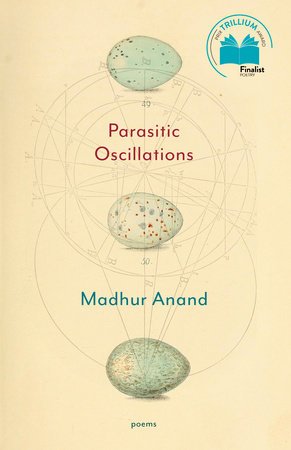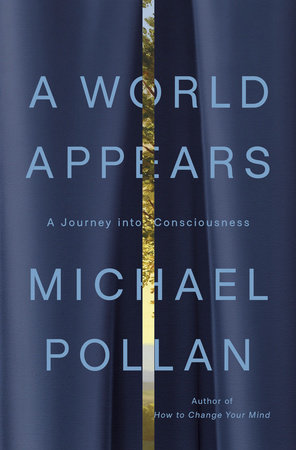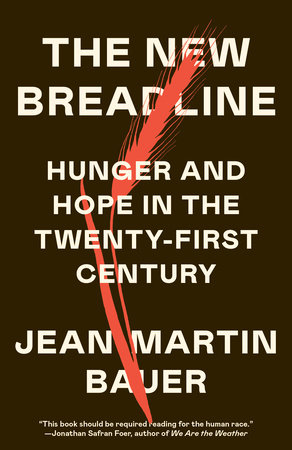Praise for Madhur Anand and Parasitic Oscillations
“Parasitic Oscillations opens with an investigation into the scientific form of birdsong and then unravels into a polyphonic musing on the historical and the natural, the lost and the found, the personal and most importantly the poetic. The poet asserts connections that have always existed; songs and nightmares can be mapped onto mathematical systems, just as poetry can be the structure by which one understands the spread of a pandemic, the building of a geodesic dome, or the conversational inflections of birdsong. Although science and poetry may routinely be characterized as opposing forces, Anand has revealed the flaws of any simplistic duality. What can be said for certain is that the trill of birdsong rings more strangely and beautifully.” —Montreal International Poetry Prize (www.montrealpoetryprize.com)
“Parasitic Oscillations subtly draws the reader into making poetry with Anand, a poetry then that happens in the heart and in the conscience. She gives us other gifts . . . she affords us the opportunity of listening and of hearing, but she does not spoon feed us. She makes poets of us as we interpret and react at the intersection always of delight and rage.” —Canadian Notes & Queries
“With Parasitic Oscillations, Madhur shares a poesis of natural history collections… She transports us to the 19th century via a collection of Indian eggs and birds by A.O. Hume (1829–1912), grounds us in the present, and encourages our minds to wander into futures. Unlike any poetry collection I’ve encountered before, bird songs are the reward on a QR code treasure hunt. The codes overlayed on images of specimens, functional – to be scanned, then transported across space and time to where the Nilgiri laughingthrush sings, reminding us it is still here. … The final poem is one of the longer, if not longest, of Madhur’s that I have read. I was delighted to then learn in the footnotes that the poem was written through collaboration – a sort of call and response – between Madhur and other artists, scientists, and species. I find the approach used to create the final poem an exciting way to write at the intersection between science and art – one that might speak to others given its potential for creating conversation between humans and non-humans through relational writing. You will find grounding and flight with Parasitic Oscillations.” —The Niche
“It’s such a distinctive and important book. In one sense, it’s a book about colonialism—environmental and otherwise. In another, a meditation on places and family. And it’s obviously churning with pointed ecological impetus. But it’s so much more than any of those themes, and more nuanced. More playful, and yet exigent . . . That phrase ‘stray capacitance’ comes up at least three times. And there should be a literary phrase like that for the energizing technique [she has] of displacing a predictable syntactical trajectory with a kind of metonymic substitution. . . . So brilliant. So fun. So constantly standing up the dendrites in my brain.” —Forrest Gander, Pulitzer-prize winner and author of Twice Alive
“Not only does Anand repurpose scientific language, but she also makes use of figures, diagrams and photographs to expand the possibilities of the poem. Below a diagram of a phase plane portrait of a mathematical model of birdsong, Anand writes, ‘Superimposing the concept of diaspora on the movement of bird specimens around the world, tracking the co-movements of natural and cultural histories to bring to light the oscillatory, but ultimately entwined interrelations of humans and nature.’ This grounding in connection leads Anand to shift perspectives, from the human as (always) subject to the human as (sometimes) object.” —Winnipeg Free Press
“I devoured this book in a two-hour sitting, fascinated by the way Madhur Anand writes about the nineteenth-century egg and bird research collections of A. O. Hume. Anand visited natural history museum research collections in the U.S. and U.K. as well as field sites in India. She writes into mathematical simulations of birdsong and talks back to letters and diaries kept by A. O. Hume. The songs and feathers and flight patterns and habitats of extinct and extant bird species flutter through these pages, and Anand’s own life (and, perhaps, our own) is in these pages too. Parasitic Oscillations is a fascinating medley of science, philosophy, and art.” —Orion Magazine
“[A] collection of innovative poems and images . . . posing questions about ecology, power, and migration.” —poetryfoundation.org
“Madhur Anand illuminates so many slants that she sets up oscillations that will lead you into other dimensions and the amalgam that is left is curiosity and wonder. . . . Reading a book of poetry can be like going to a foreign country. It can be colourful and energetic, strange, luscious, and yet at the same time somewhat unknowable. But we feel privileged to have visited.” —GuelphToday
“Wonderful book. …I will read it again and again, I’m sure.” —Shani Mootoo, author of Cane | Fire
“Lyric poets from many regions, traditions, and cultures have long dreamt of making the human voice approach the condition of birdsong. In Parasitic Oscillations, Madhur Anand approaches this literary problem from a wholly different angle, making birdsong her object of study with the precision and amplitude of an environmental scientist working on mathematical models of avian behavior in complex ecological systems. By the end of this innovative collection, the most ancient and universal metaphors for poetry—as song, as flight—are made new through Anand’s aesthetic research into global intimacies of the human and the nonhuman alike. ‘There are very few things / that are stronger when they are far apart,’ writes Anand. Perhaps poems can sing their song, too.” — Srikanth Reddy, professor and author of Underworld Lit
“Parasitic Oscillations traces a ‘path travelling back to a higher dimension . . . formant and filtering.’ This is a pathless path, crenallated by ‘live’ edges, industrial memory, and the time crystals of colonial (and anti-colonial) artifacts that refract beyond their capacity to be restored. Madhur Anand has written a book that attends to an on-going ‘vanishing’ with brown clarity, in the cardinal, ever-fluxing space between ‘the actual and the desired.’” —Bhanu Kapil
“The poems in Madhur Anand’s Parasitic Oscillations track a variety of losses with all the rigor and care of her scientific training. She segues seamlessly from the loss of bird species, to the loss of a motherland and a mother, to the loss of presumed safety during the pandemic. A reader may feel a series of trap doors opening beneath her feet. This is a new, more inclusive and global eco-poetics where we too are specimens. As she warns at the end of one segment: ‘Tag yourself.’” —Rae Armantrout, Pultizer-prize winning author of Conjure
“In the formally inventive Parasitic Oscillations, Madhur Anand, once again, makes scientific inquiry both intimate and vital, but ‘There is a more inner view,’ within, as well. This is a tour de force of life and one of the greatest long poems, ‘Slow Dance,’ that I’ve ever read, period. In this collection of evidence of what is seen and of what is lived, we have a poet at the top of her game. Anand offers the brilliance of the learned and of the lived, of the curious and of the accomplished. And, yes, there’s the music of the birdsong, which Anand—lyrically, generously—offers as a soundtrack to show us how to fly. This is some soulful, beautiful work.” —A. Van Jordan, professor and author of The Cineaste
“Anand’s Parasitic Oscillations: pheasant feathers and Maxwell’s equations, imagination and analysis, metaphor and fact, sideways glance of a poet and direct gaze of a scientist, beauty and beauty.” —Alan Lightman, professor and author of Einstein’s Dreams














